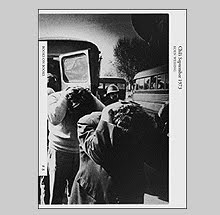Beaufort West by Mikhael Subotzky

Fear is a huge driving factor in 21st century life as evidenced by recent political acts of desperation. Terrorism, crime and illegal immigration have kept the media busy with threatening sounding stories and "what might happen" scenarios that appeal to isolationism and make people comfortable with their natural tendency towards xenophobia and racism. Division created by infecting viewers with enough anxiety that they imagine the barbarians are at the gate and those entering are less than human. This is one of the many underlying themes in Mikhael Subotzky's new book from Chris Boot called Beaufort West.
Beaufort West is a small town in South Africa -- a transit point for food or sleep that sits on the long road between Cape Town and Johannesburg. As described by Subotzky, it is trapped in its own "victim/perpetrator divide" due to unemployment, crime and domestic violence. As Subotzky describes, "The problem is that so much of the way crime is represented in the popular media polarizes victim and perpetrator, us and them, the law-abiding citizens and those who the law-abiding citizens have to fear. I almost see this as a new kind of apartheid - between those that fear and those that are feared."
The town radiates out from a large traffic circle within which lies the town's prison. Subotzky uses this metaphor as the starting point for an exploration into the town's post-apartheid reality. Perhaps in proportion to the economic reality of Beaufort West, Subotzky spends more time among the lesser fortunate black residents. Trusted to work freely, he describes their lives with surprising intimacy that at times even surprised him. "Major and I were hanging out with a group of gangsters, and they were talking about going off to rob someone's house... To my surprise they asked if I wanted to come along."
Subotzky structures Beaufort West as if we were airdropped into town and left to wander. Quickly we get swept up in the lives of the marginalized; the trashpickers at the local dump, the white citizens at a livestock show, households that set up makeshift taverns in their homes, a prostitute as she engages in sex with truckers, and finally, Subotzky leads us to prison - the final stop for many of the residents.
Subotzky's photographs are more in the camp of greats like David Goldblatt, whose In Boksburg Mikhail cites as an early influence. His medium format camera and color film frames both the spontaneity of action and the stillness of portraiture with well made compositions. These photographs owe much to the different qualities of light to add another seductive element. Whether natural or artificial, the scenes are bathed in light that falls gracefully onto the grit and grime of interiors and exteriors alike.
Beaufort West is a tight edit of 45 photographs and the book's dimensions at approximately 11" x 14" allow for a nice large plate size. The design is very clean down to the spare blue fabric coverboards. In the rear of the book, after the plates, Subotzky provides a bit of text about each image which reads as a running commentary about his process and his discoveries made during the course of his exploration.
Beauford West sits in the middle of the South African desert as a kind of real life purgatory. As Jonny Steinberg writes in his afterword, "These photographs thus represent a place in which far too many people do not possess the basic structure of what we regard as an inhabitable life; a sense of life as a project, or at any rate some sort of progression; the notion that one might leave a legacy, or build something that survives one's own death." It is that state of lethargy and punishment contrasted with a purifying grace that radiates from the subjects that Subotzky skillfully brings to our attention. In short, this is a remarkable first book from a young photographer.











